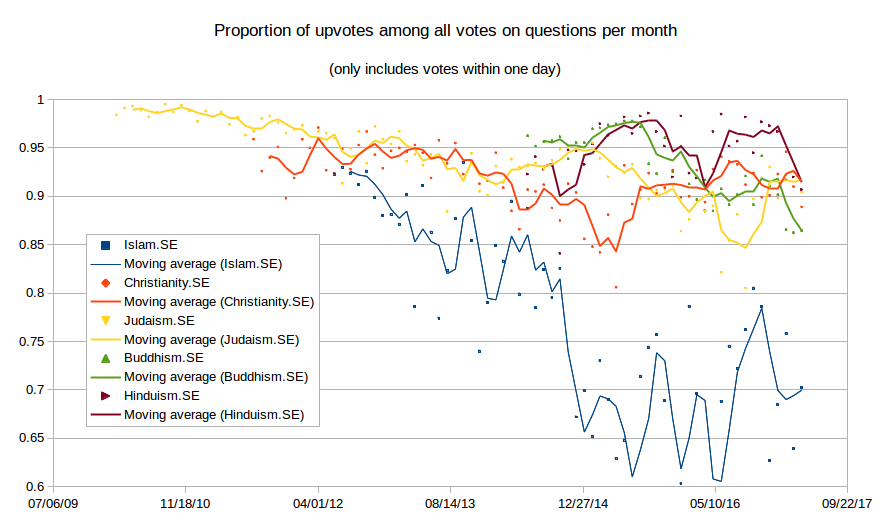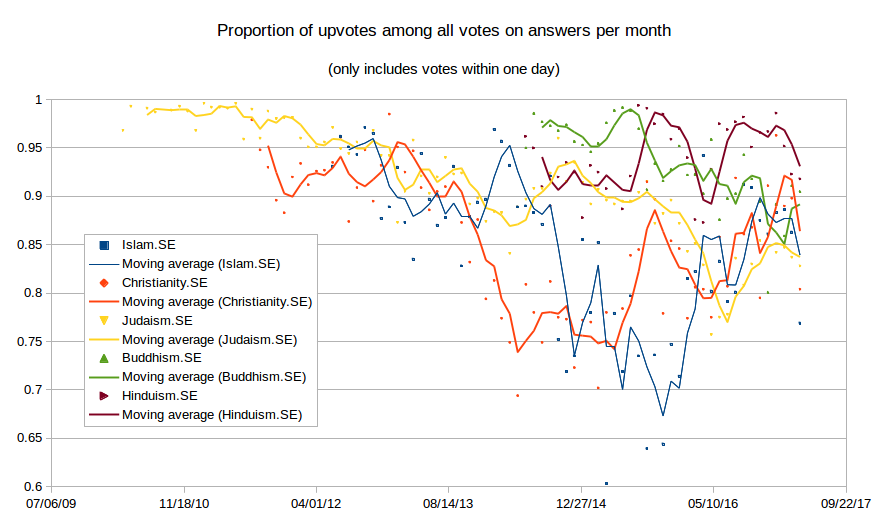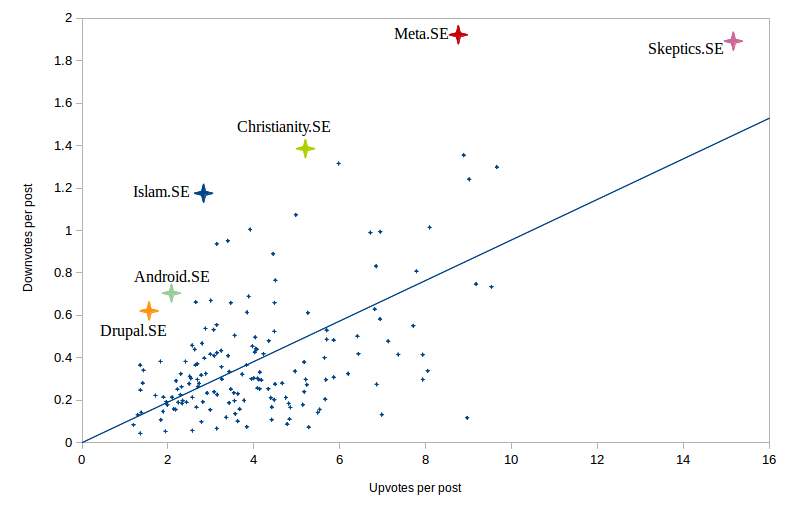TL;DR: I observe that it's harder here than at other religious StackExchange sites to get a post upvoted, and upvoted highly. Downvotes are disproportionately used on questions. I conclude this is primarily because:
- We have fewer users who vote;
- The few users who do vote, tend to downvote more; and
- We have set a lower base level of voting.
If this is correct, we should strive to change this. Privilege levels are set StackExchange-wide (and will be raised when the site is launched), so upvoting less than other sites inhibits self-moderation and graduation.
It’s only through voting that a class of editors, closers, and moderators can emerge to help run and govern the site. -- Vote Early, Vote Often, Jeff Atwood, 2010
Data:
I define upvote attrition* as how unlikely a post with a positive score is to attract additional upvotes. Thus, high vote attrition implies fewer highly upvoted posts, and thus less content that we've deemed high quality. Considering only the 2017 posts, we have:
upvote no. posts no. posts no. voters
attrition >=1 score >=10 votes
Islam.SE 52.7% 1612 994 (62%) 36
Buddhism.SE 50.0% 1416 985 (70%) 45
Hinduism.SE 42.1% 1179 972 (82%) 38
Judaism.SE 37.5% 2950 2125 (72%) 86
Christianity.SE 30.3% 1238 943 (76%) 78
Modification (4 May 2017): Using a data explorer query, plot the proportion of votes within each month which are upvotes below. This is restricted to votes which are made within 1 day of the post being made (this avoids the "cleaning up old posts" issue).
Questions:
Answers:
In this meta post, I observed that:
In 2016, there were 7 posts with a score of 10 or more... compared with 103 for Christianity.SE; 103 for Judaism.SE; 17 for Buddhism.SE; 82 for Hinduism.SE.
For 2017, the number of +10 posts are: 48 (Christianity.SE), 35 (Judaism.SE), 5 (Hinduism.SE), 2 (Buddhism.SE), 2 (Islam.SE). Not much has changed in this regard.
Addition (15 May 2017): Through a data explorer query, we plot the per-site average number of upvotes per post vs. the average number of downvotes per post below:
Conclusions:
We don't have enough users who are (up)voting. The "no. voters" column indicates this is a factor. With only a small number of users upvoting, we may simply run out of users to upvote good content.
The few users who vote, are more likely to downvote here as indicated by the comparatively low proportion of upvotes at Islam.SE. This was raised previously: Why does this SE site issue out more downvotes without comments than other ones?.
The up-vote privilege comes first because that's what you should focus on: pushing great content to the top. Down-voting should be reserved for extreme cases. It's not meant as a substitute for communication and editing. -- Vote Down
Our base level of voting is set lower here as evidenced by the high upvote attrition rate:
Every Stack Exchange site will eventually end up with a different "base level" of voting --- that is, the expected number of upvotes for a question of a given level of excellence. (This effect occurs because people see a good question, but already with a certain number of votes, and think "oh, I would have upvoted this, but it already has enough".) -- Scott Morrison, 2010, TeX.SE
As Medi1Saif wrote:
Often a 0 or 1+ seems to me equal to a 5+ or 10+ on other sites
(Alternatively, 2. and 3. could be because we're not generating good content. But I don't think that's correct.)
Consequences:
If these conclusions are correct, it inhibits functionality, most notably by:
- The thresholds for privileges and badges are uniform across StackExchange (and they will go up if Islam.SE is launched). A low base level of voting therefore inhibits self-moderation and graduation.
But also in other ways, e.g.: Islam.SE questions are less likely to become hot questions (see formula at meta.SE).
Appendix:
* Let V(x) be the number of posts with score x between 1 and 10. I define upvote attrition to be the median of (V(x)-V(x+1))/V(x) over scores x between 1 through 9. I calculate this for 2017 posts.



